By Arinze Chijioke
There has been a recent upsurge of turnout by intending voters in the ongoing Continuous Voter Registration (CVR) by the Independent National Electoral Commission (INEC) in the Southeast, a situation many view as encouraging in a region that has been defined by voter apathy since 1999. However, as the crowds of intending voters swell in the various registration centres, official INEC weekly CVR Updates for the zones do not seem to reflect this noticeable upsurge of new registrants as the Southeast firmly remains at the basement of the Table of newly registered voters week after week. In this Investigative Report to understand the observed dissonance between the upsurge of intending voters and the low number of (actual) newly registered voters across the five states in the Southeast, Arinze Chijioke looks at how insecurity, extortion and INEC’s bureaucratic bottlenecks could weaken participation and promote voter apathy in the region.
The sun scorches this Friday afternoon inside the Enugu State University Teaching Hospital, Parklane. It is June 10, 2022. At one end of the hospital, at least 2000 adults, both men and women are gathered under a canopy. Some of them sit. Others stand.
They had come from various locations across the state to partake in the Continuous Voter Registration (CVR) by the Independent National Electoral Commission, (INEC), which involves transfer update, replacement of lost/damaged Permanent Voter’s Card and data update.
Among the waiting crowd is Chinelo Joseph (not real name) who has been standing with her baby strapped to her back and sweat dripping down her body as she waits to get the form for change of location. She is tired and hungry, but with the little energy left , she is willing to wait the whole day to achieve her aim. She has been encouraging others not to go away.
“It is PVC or nothing, I am determined to secure a bright future for my children,” said the nursing mother who arrived at the venue at 8 a.m. “I am not willing to leave till I complete the process because the time has come to make Nigeria work again.”
Like Joseph, others who had come for the CVR are not willing to leave the venue. When they do, it is because they want to get something to eat or have resolved to come back the next day. The story is the same across at least four external registration centres and INEC offices in the state.
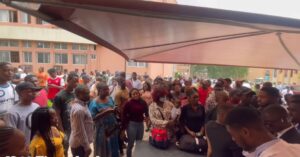
In recent weeks, there has been an upsurge in the number of adults, particularly in the Southeast region, who want to register and have their PVCs ready ahead of the 2023 general election. The younger generation – who feel their future threatened with increasing insecurity and cost of living, lack of investment in the education sector, leading to endless strikes – are hungry and desperate for true change.
On Friday, June 10, pictures and videos showing thousands of young Nigerians gathered at the Tafawa Balewa Square in Lagos to register for their PVC ahead of the youthvotecountNG mega concert – under the European Union Support to Democratic governance – made the rounds on social media.
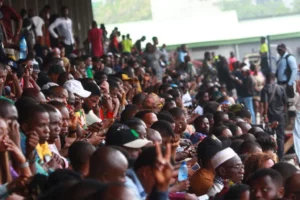
While the involvement of players in the music and comedy industry might have encouraged the massive turnout, it was more about an increased sense of responsibility on the part of Nigerians who are tired of the status quo and want to take back their country.
INEC’s announcement that it was going to end the ongoing CVR by 30 June 2022, was all those thousands of people, particularly in the Southeast, needed, to get involved in the electoral process. The commission had ended its online voter pre-registration on May 30.
As at June 6, the Weekly Update from INEC showed that the Southeast sits at the bottom of the table with only 683,066 newly registered voters after the 2019 general elections.
A breakdown of that figure shows that Ebonyi State leads with 274,640, followed by Anambra which has 159,937 newly registered voters and Abia with 108,127. While Enugu sits at the fourth place with 72,237, Imo comes in last with 68,127 newly registered voters.
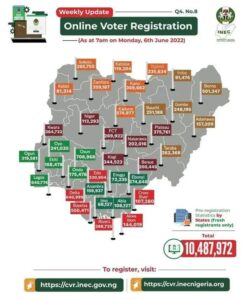
To change the narrative, adults across the five states in the region – in what can be best described as a revolution – have been besieging INEC’s registration centres to get registered.
Ugochukwu Anekwe, a political analyst, says young people have realised that it is possible for their votes to count, which is a credit to INEC. According to him, what is being experienced is a replica of the 2020 #EndSARS protest by youths to fix the rot in the police.
“Several months of strike has kept students away from their classrooms.
“There is increasing cost of living and rising insecurity. All these are pushing the younger generation to rise,” he said.
For Keneth Ofoma, Special Adviser on Media to the All Progressives Congress, (APC) chairman in Enugu State, Ugockukwu Agballa, the recent surge was as a result of the hope that votes will now count, with the passage of the 2022 Electoral Act and the electronic transfer of results which is provided by the act.
INEC’s bureaucratic bottlenecks
On a daily basis, people abandon their jobs and businesses and spend several hours in queues. Sadly, they end up not getting registered for reasons ranging from lack of enough machines to attend to the multitude to lack of personnel across various centres; and from lack of forms for registration to poor network. There are also reports of how officials display lackadaisical attitude by not coming to work on time.
To ensure that more people get registered, non-governmental organizations and other groups have been collaborating with INEC to establish more registration units outside already established centres across LGs. Some political leaders in the region such as Senator Enyinnaya Abaribe and those in the entertainment industry have also encouraged people without PVCs to try and get registered ahead of the deadline.
In Enugu for instance, more centres have been opened at Okpara Square, Parklane, Enugu State University of Science and Technology, ESUTH, and the Adoration Ground in Emene. Across these locations, people are using their personal laptops, phones, and data to help with transferring of polling units, replacing lost PVCs and revalidation and updating of data.
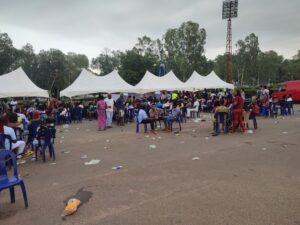
Although the establishment of more centres provides opportunity for more people to get registered, investigation by Ikengaonline shows that lack of enough machines and staff poses a challenge.
Joseph finally got her form at 2 p.m. and registered. But it took the intervention of popular Nollywood actor and comedian, William Uchemba, who went to the INEC head office where he got an extra machine and other materials for registration. INEC had deployed only one machine to serve over 2000 people.
Uchemba- whose foundation has been engaged in the mobilisation of voters- had told the thousands that gathered at the Okpara Square the previous day that he would rather wait in a long queue for eight hours and get his PVC than suffer another eight years under the wrong choice.
The actor, who also visited the Adoration ministry and ESUTH, which only had two machines and over 5,000 unregistered people asked INEC to extend the date for the registration as millions of Nigerians have yet to get their PVCs.
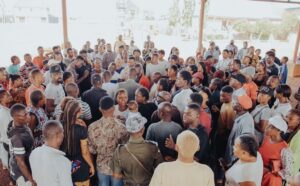
Victor Bobby, a recent University graduate who has visited the Square severally to register for his PVC said that the challenges encountered by voters are fueling the perception that there is a deliberate ploy by INEC to dis-enfranchise eligible voters in the region.
“In the entire Enugu South, there are only five machines that are supposed to be used to register thousands of people,” he said, adding that there are local governments that have only two machines.
While Ogbuji thinks it is deliberate, Anekwe blames some INEC workers who according to him, are trying to exploit people because they have seen the rush. He said that on Tuesday, June 7, they came with only three machines to attend to over 3000 people who came to register at the Square.
“We went and met with the Resident Electoral Commissioner and the next day he provided more machines,” he said, adding that where there are more challenges are offices across local governments.
Now, at least 1000 people get registered every day at the square and Anekwe says that the plan is to ensure that more people get registered as Enugu has the least number of registered voters.
While noting that the plan is to deploy some of the machines from the Square to the local governments, Anekwe said that the emergence of Peter Obi as candidate of the Labour Party was a major factor encouraging many people who see the hope of a new Nigeria in him.
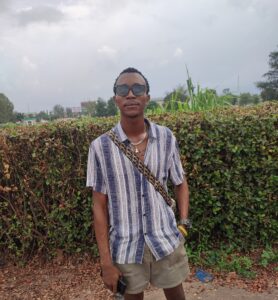
Allegations of extortion in Abia
Apart from the widespread bureaucratic bottlenecks that are slowing the registration process across the Southeast, there are also allegations that some INEC officials now collect money to move their machines to other locations, and from individuals to get them registered.
After he realised that many people had not been registered, Chukwuebuka Ezennaka, a political activist and businessman in Abia State said he went to the Umuahia North LG where he met with the Electoral Officer, Mrs. Onyigbo, and requested that more machines be provided at other locations to enable more people get registered.
“After I explained to her and said we will need at least six days, she told me that I will have to pay 50,000 for each day as logistics and that she will release four of her workers who will help to carry out the registration” Ezennaka alleged.
He said that he offered to pay N20,000 per day but she refused and said that politicians seeking elective positions pay N100,000 daily whenever they want INEC to come to their communities and other locations to register voters.
He noted that Onyigbo had told him that she charges money because her office at the LG does not get funding that comes into the state from the headquarters and that is supposed to take care of basic logistics.
To get the INEC to take two machines to the Abia State Polytechnic and register students, Ezennaka said that he and others individuals paid 60,000 – 30,000 for each – apart from an extra 10,000 they paid for feeding and transportation of the officials.
He alleged that he had written to Dr. Iloh Joseph, the INEC Resident Electoral Commissioner in the state, informing him about the challenges people were facing with the registration process.
“I told him that many people were yet to register in Abia North and South and market areas, but he said it was untrue and that INEC had taken care of all those areas in 2021.”
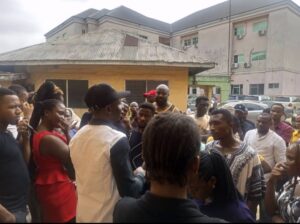
Investigation by Ikengaonline further reveals that in addition to lack of enough machines, there is also a lacklustre attitude to work on the part of officials in the state. On a visit to the Umuahia North LG headquarters, it was discovered that while they had two machines working, only one was used to register people. Workers were seen holding discussions.
It was also discovered that some of the officials do not show up at work on time. While they are required to resume work by 9 a.m., some of them come around 11 a.m., leaving people who want to register stranded.
On one of the occasions when he visited the headquarters of the commission in Umuahia, Ezennaka said he saw eight machines, but only six were being used to register people because some of the officials did not come to work. At the end of the day, less than 500 people were registered out of over 2000 people present. Across LGs, less than 100 people get registered every day out of thousands waiting to register.
“We want more machines and more locations because there are people who are willing to help INEC with the registration,” said Ezennaka. “There are voters who cannot even afford to get to the offices.”
At Onitsha North and South, Idemili North and Nnewi South, for instance, in Anambra State, there are allegations that officials are collecting between N1500 and N2000 from voters while those who are not willing to pay are asked to remain outside or go home and come back the next day.
When contacted, Mrs. Onyigbo denied that she or any officer had ever asked for money for machines to be used for registration of voters outside of the LG. “The allegation is not true, just disregard it,” she said.
The public affairs officer of INEC in the state, Bamidele Oyetunde, also said that he had not received any complaints regarding the allegations of extortion.
“No officer can ask anybody to pay money for machines to be taken to locations outside the office.
“We have even taken some of our machines to some communities that organized themselves,” he said.
He noted that the commission has so far received enough machines that can take care of the 17 local governments in the state, adding that there is no local government that does not have up to three machines currently.
In Imo State, fear of being attacked poses threat
In April 2022, Anthony Nwokorie, an official of the INEC was killed after gunmen attacked Isinweke, the headquarters of the Ihitte/Uboma Local Government Area of Imo State. The deceased had gone to the location with other officials of the commission to register voters when the gunmen attacked, killed him, and dispersed the crowd.
Two months after, the attack is still fresh and the commission, for fear of exposing its workers, had limited its registration to some LGs and few locations within the state capital such as the Assumpta Catholic Cathedral.
In Orlu, Orsu, and Oru-East LGs that have come under intense attack, registrations are not ongoing and people are required to come to the state capital to get registered.
Apart from security-related challenges, however, there is also the problem of lack of machines and staff to meet up with the growing number of interested registrants. Because the machines are just at some LGs, some people find it difficult to come out.
At the Assumpta Cathedral, for instance, over 2000 people gather daily. But most of them don’t get registered because there are only four units. While the Director of Voter Education for INEC in the state, Emmanuella Opara, says the commission has increased the unit to six to enable more people to get captured, only about 500 out of 2000 people get registered daily.
For instance, Grace Madu has had to visit the cathedral on four occasions to get registered. Though she is determined to get her PVC, she says the process can be frustrating especially because some of the machines don’t function as they should.
The situation is worse in some of the LGs and registration points in the state as there are only two machines for over 3000 people. In Owerri West, Owerri Municipal LG, registration is ongoing but slowly, compared to the number of voters that come out to register.
Kingsley Uwaleke, a realtor based in Owerri says that INEC has promised to open more centres in churches and schools that are secured. He however adds that they ought to speed up the process of opening the centres and distributing more machines to meet the increasing number of people who want to register.
“While there are security challenges in communities, INEC can go to schools within the metropolis, he said.
“They also need to increase the number of machines and officials across the LGs where registration is ongoing.”
He regretted that part of the problem is that many people besiege INEC offices for issues they can solve with their smartphones such as transfer of polling units, replacing lost PVCs, revalidation and updating of data.
He said that he and other individuals have been moving around centres and helping people get registered after they informed INEC about their willingness to assist and got approval, adding that so far, they have helped over 4000 people in the state with their registration.
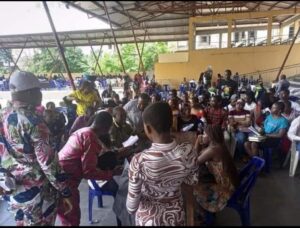
Like the situation in Imo State, Anambra has had to battle insecurity. In the past few months, some LGs in the state have been burnt by gunmen, a development which INEC says is contributing to the slow pace of registration of voters.
But while some officials of the commission blame the slow pace of registration on insecurity, others blame it on lack of machines to register voters. Some of those who spoke to this reporter on condition of anonymity blamed the authorities at the state level whom they say have refused to release more machines to LGs in the state.
“We have complained to them about the need to bring more machines, yet nothing has been done,” he said.
“We are only using the ones we have available.”
In Onitsha North where three machines were supplied for instance, only two are working after one developed fault. Since it was taken to Awka for repairs, it has not been brought back.
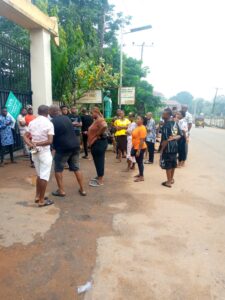
Comr. Chidi Nzekwe, who has monitored the process in Awka South, said that there are only four machines (This was before the deployment of 209 machines by INEC in the Southeast, Lagos and Kano states) which are used to register only 80 voters out of over 500 hundred people who come out daily.
Nzekwe, a labour activist and member of the Nigeria union of local government employees, said that he had held conversations with the commission on the need to have more centres.
“They have accepted, and we are waiting for their approval. There are several people who are willing to help with the entire registration process,” he said.
Traders in the state have called on INEC to extend the voter registration centres to the markets as some of them who have tried to register at the LGs were unsuccessful due to large crowds. They say the registration will enable them to actively participate in the 2023 elections and subsequent activities.
The commission however insists that it is working to attend to the massive turn-out of eligible voters. Its Public Affairs Officer, Mr. Reginald Onyeukwu, was quoted as saying that the commission had re-opened its four local government offices – Ayamelum, Nnewi-South, Idemili-North, and Ogbaru – initially closed because of the wave of attacks to enable it attend to the massive turn-out of eligible voters.
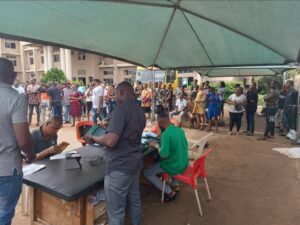
In Ebonyi, lack of machines, manpower remain a challenge
Although Ebonyi leads other states in the Southeast with 274,640 newly registered voters, according to INEC’s weekly update as of June 6, lack of machines and manpower to attend to the growing number of voters remains a major challenge.
At the Abakaliki office of the commission, there are three machines. But not all of them are used to register the crowd that besieges the office. While one of the machines is used for mop-up exercise in areas where the on-going voter registration exercise could not commence early either due to technical or logistical challenges, one is used for offline registration and only one is stationed at the office.
Benard Chinedu, a volunteer with Take Back Naija- a movement which has also been involved in mobilizing voters- said that the story is the same across different local governments in the state. According to him, if left unaddressed, many interested voters might not register before the deadline by INEC.
As early as 7:30 a.m. on Tuesday, June 7, over 200 people had already gathered at the commission’s main office at the Abakaliki LG council headquarters in Nkaliki. Before the day ended, there were over 1000 people. But only about 200 were registered with the one machine and a staff available.
“Many people return home every day after spending several hours in long queues. They come back the next day and the story is the same,” he said, adding that officials sometimes work for two hours and go on break.
Chinedu said that his organization is trying to get INEC to spread across schools, churches, and markets as there are people willing to help with the registration process, provided machines and other materials needed are available.
“We have spoken to the INEC about it and they say they are willing to have us work with them,” he said.
“We intend to have three additional centres, depending on the number of machines we get.”
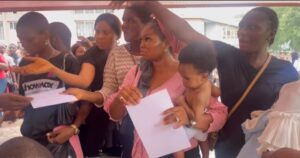
Obi reacts to INEC’s bureaucratic bottlenecks
Worried by the increasing complaints about INEC’s snail pace registration of voters, particularly in the Southeast, former Anambra State governor and candidate of the Labour Party (LP) in the 2023 presidential election, Peter Obi, took to his Twitter handle on Thursday, June 9, calling on the electoral body to ensure that voters were registered.
“Information reaching me indicate that voter registration across Nigeria, more so in the Southeast, is dogged by inertia & bureaucratic bottlenecks.”
“I respectfully call on @inecnigeria to facilitate speedy registration of Nigerians to enable them exercise their voting rights,” he tweeted.
His tweet elicited several reactions, with some Twitter users sharing videos of locked INEC offices and people waiting in the sun to be attended to.
Recall that Obi had joined the LP in May, after he resigned his membership of the Peoples Democratic Party (PDP) and withdrew from the party’s presidential primaries over issues he said were “at variance with his person and principles.”
His emergence as candidate of the LP in the presidential election – and pledges to move Nigeria from a consumption to a producing economy, address insecurity and lapses in the education sector – is believed to have aroused the political consciousness of young people in the country.
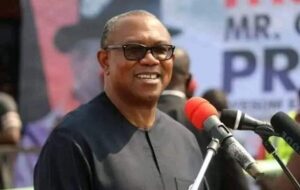
INEC moves to address massive voter turnout
After it received a series of complaints from states, indicating an unprecedented surge in the number of citizens that wish to register as voters and the challenges they face, INEC approved the release of additional 209 machines to the five Southeast states, as well as Lagos and Kano states where the pressure is most acute.
In a statement released on Friday, June 10, Chairman of INEC’s Information and Voter Education Committee, Festus Okoye, said that the commission convened an urgent meeting with all the Resident Electoral Commissioners (RECs) to review the situation so that eligible Nigerians who wish to register can do so.
According to him, the necessity to urgently deploy more voter enrolment machines to ease the congestion at the registration centres was identified as a priority. He noted that the Commission will make sure that Nigerians who present themselves for registration will be registered because it is their constitutional right.
He maintained that the sudden surge is an affirmation of the increasing confidence Nigerians have in the electoral process, adding that the Commission will continue to ensure that this confidence is sustained.
As at Tuesday, June 14, INEC offices across states in the Southeast had received and started configuring their machines. More centres have also been established.
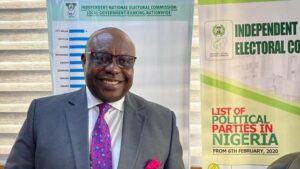
But while the latest move by INEC is expected to help change the perception that there is a deliberate plot to dis-enfranchise eligible voters in the Southeast, a legal practitioner with Charles Anthony (Lawyers) LLP, Chukwudi Unah, Esq, thinks that the only way for INEC to build confidence in the people – apart from deploying more machines – is to extend the June 30 deadline for the closure of the CVR.
“The commission must also ensure that the elections are free, fair and credible and that they reflect the true wishes of the people, “he said. “That will boost the people’s confidence in the process.”
Concerns have also been raised about the number of machines sent to the region and how they will not serve the number of people who want to get registered. For instance, only 14 new machines were reportedly deployed in Imo while eight were taken to Ebonyi and 20 in Enugu. Emeka Ononamadu, the Residential Electoral Commissioner for Enugu, confirmed receiving the 20 additional machines for Enugu to Ikengaonline. While the number of machines in Anambra State is unconfirmed, Oyetunde said that Abia state got enough machines to go around.
Efforts to get Mr Festus Okoye to respond to allegations of extortion by members of the commission failed as he neither responded to a text message sent to him nor returned his calls.
Civil society reacts
The Socio-Economic Rights and Accountability Project (SERAP), had in May, urged INEC to extend the voter registration deadline in line with the extension it granted political parties for their primaries. Other civil society organizations such as the Nigeria Civil Society Situation Room have also lent their voices to the demand for an extension.
In a letter dated May 28, 2022, and signed by its Deputy Director, Kolawole Oluwadare, SERAP said that the extension will give more time for eligible Nigerians to exercise their right to participation the same way the electoral body had extended the deadline for party primaries.
“Voters are also critical stakeholders in the electoral process. Treating all eligible Nigerian voters fairly would advance the people’s right to vote and to participate in their own government,” the organization said.
This Report is part of activities by the African Center for Transparency (ACT) under the Collaborative Media Engagement for Development Inclusivity and Accountability Project, a multi-level intervention for media independence and government accountability, managed by the Wole Soyinka Centre for Investigative Journalism (WSCIJ) and supported by MacArthur Foundation.

